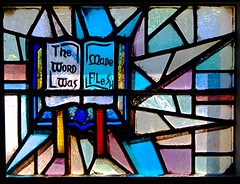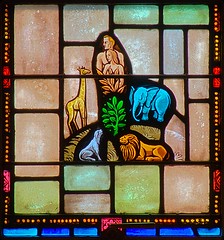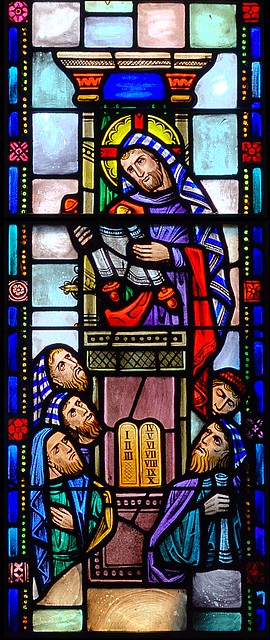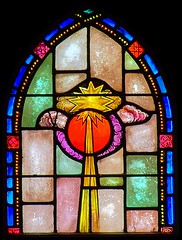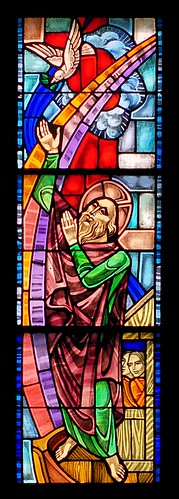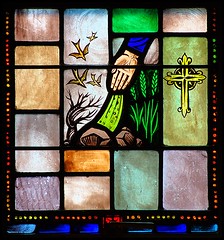by Pastor Paul Wolff
 |
| Most images of this event in Luke 2 can be somewhat misleading. The boy Jesus came to learn, not to teach. |
“And the child (Jesus) grew and became strong, filled with wisdom. And the favor of God was upon him. Now his parents went to Jerusalem every year at the Feast of the Passover. And when he was twelve years old, they went up according to custom. And when the feast was ended, as they were returning, the boy Jesus stayed behind in Jerusalem. His parents did not know it, but supposing him to be in the group they went a day’s journey, but then they began to search for him among their relatives and acquaintances, and when they did not find him, they returned to Jerusalem, searching for him. After three days they found him in the temple, sitting among the teachers, listening to them and asking them questions. And all who heard him were amazed at his understanding and his answers. And when his parents saw him, they were astonished. And his mother said to him, “Son, why have you treated us so? Behold, your father and I have been searching for you in great distress.” And he said to them, “Why were you looking for me? Did you not know that I must be in my Father’s house?” And they did not understand the saying that he spoke to them. And he went down with them and came to Nazareth and was submissive to them. And his mother treasured up all these things in her heart. And Jesus increased in wisdom and in stature and in favor with God and man.” (Luke 2:40-52)
God’s Word is the greatest treasure on earth. There is nothing on earth that can give you the blessings that God’s word can give. God had the Holy Bible written to show us what He has done to save us, so that we might trust in Him and be saved through that faith. God Himself works through His Word to bring you forgiveness and salvation. Nothing else in all the world can save you from sin and death and give you eternal life in God’s paradise. That is why God’s Word is such a great treasure.
 |
| The Word became flesh and dwelt among us, and we have seen his glory, glory as of the only Son from the Father, full of grace and truth. (John 1:14) |
God’s Word is such a treasure that God has made sure that from the time that Moses wrote the first five books about 3,500 years ago until now, the Holy Bible has been preserved so that at all times in history God’s people could hear it or read it and learn that God is our loving Father and creator and redeemer. God’s Word first shows us that we are all sinners, descended from Adam and Eve, and we would all be under God’s condemnation, but for God’s mercy. This is likely why more people do not appreciate this great treasure. Sinners don’t like to be reminded of the truth of our sin. We like to think we are better than we are, and more holy. The truth, however, is that we are rebellious sinners, and we all desperately need God to save us from death, which is the condemnation of sin. Every person who ever lived on earth before 1903 has died. That includes the one man who never sinned nor deserved death, but who gave His life to redeem us all from the curse of sin. That man is Jesus. We need to hear the truth of our sin, no matter if we want to or not. If we deny the truth of our sin, then we will deny the blessings God has provided for us in Jesus. But, as Saint John wrote, “If we confess our sins, (God) is faithful and just and will forgive us our sins and purify us from all unrighteousness.” (1 John 1:9)
 |
| God became incarnate as a man to redeem sinners from sin and death. |
God’s Word does not only tell us how bad we are, and how much we need a savior, but it also shows us what God has done through Jesus to rescue and redeem us from the consequences of our sin. God, in His essence, is a Spirit, and He is eternal and cannot die. In order for Him to provide for our redemption the Second Person of the Trinity became incarnate as a baby who grew into a man. He is like us in every way, except without sin. Jesus had to be a man so that He could not only keep and fulfill God’s Law, but so that He could offer His life in payment for the lives of all of us sinners. We might not know any of this, except for the fact that God had it written down and preserved for us to hear and read and know, so that we may be saved.
The Bible was not just written for you and me. God also had it written and preserved for Jesus, also. When Jesus read the Bible it was a little different! The Bible Jesus read was not different than what we read today, but Jesus is a little different than us because He is holy and sinless. Also, because the Bible is all about Jesus, it affected Him a little differently. Jesus once told the Pharisees, “You diligently study the Scriptures because you think that by them you possess eternal life. These are the Scriptures that testify about me, yet you refuse to come to me to have life.” (John 5:39-40)
In His state of humiliation, Jesus did not remember being equal with God the Father, and the Holy Spirit. He had to learn about God the same way we do – by reading the Holy Bible. Jesus also had to trust that the Bible is God’s Word, and is completely true. This was especially important when Jesus was dying on the cross. When He was suffering the Father’s wrath for the sins of the world, He only had to rely on God’s promises in the Holy Scriptures that this was God’s will, and that everything He was doing would work out for the glory of God, and the salvation of the human race.
 |
| God’s Law is good and righteous but it condemns sinners. Jesus had no sin and was not condemned by God’s Law. |
God’s Law did not condemn Jesus – because He did not inherit the corruption of sin from His mother, and He committed no sin in His life. Jesus happily obeyed God’s Law because as the Son of God, the Commandments of God completely fit with His holy nature. Where we would naturally rebel against God’s commands, Jesus naturally obeyed God’s commands, and was happy to do so. We, too should be happy to obey God’s commands, because they are good and right and beneficial to each one of us and to our neighbors, but because we are corrupted by sin, we don’t always do so.
Also, Jesus had a slightly different perspective concerning the salvation promised for us. Jesus did not need salvation from sin, since He had no inherited sin. Also, because Jesus was sinless in everything He did, He was not condemned by God’s Law. However, Jesus was the one sent from God to pay the price for the salvation of us sinners. Though, because the price was the sacrifice of His life, the promise of salvation which gives us great hope and comfort was a death sentence for Jesus, if He was willing to endure it. Jesus would need to trust in God the Father to rescue Him from death if He accepted the Father’s will and desire that He would give His life in exchange for our forgiveness and salvation. The Father did not force Jesus to give up His life, and suffer and die for sinners, but because it was the Father’s will that Jesus would redeem us from our sins, then Jesus was willing to please the Father and do what was needed to save us from our sins – including innocently suffering crucifixion and God’s wrath over our sins, and dying to pay the price for sin.
Luke tells us that Joseph and Mary went to Jerusalem every year for the feast of the Passover. He doesn’t tell us if Jesus went with them also, but, whether He did nor not, the year he turned 12 was special. He had attained a certain level of maturity, and was likely allowed a little more freedom and autonomy than before. I’m sure it helped that Jesus was perfectly obedient and sinless, because Joseph and Mary knew they could trust Him to do what He ought to do. Though, on this occasion, what Jesus rightly did, was not particularly what they expected Him to do.
 |
| It is likely that Jesus came to learn about God’s mercy for His people in the events of the Passover. |
Luke doesn’t tell us what Jesus and the teachers talked about, but an obvious topic of conversation would have been the Passover, and its meaning for Israel, and for the Messiah. He might have asked something like, “What was the Passover all about?” They would have told Him, “The Passover was the salvation of the people of Israel. God had decreed that the firstborn in every household of Egypt would die. However, among the Israelites, God would accept a substitute – a lamb – who would be sacrificed instead of the firstborn. The substitute, the lamb, would die, so that the firstborn child would live. This showed God’s mercy and love.” Jesus would have learned that it is good and right to love God with all His heart, soul, mind and strength. God is a just and righteous God, but He is also merciful and forgiving to sinners, and loves them. Because Jesus is one with the Father and the Holy Spirit, He also felt the same way about sinners, even as a boy, and even later as a man.
If people sin against you, you likely would want revenge, or at least just punishment. You are not likely to suffer and die for the people who betrayed you, or hurt you, or murdered you. But Jesus is different.
When the twelve year old Jesus was talking with the teachers in the temple, He might also have asked what the events of the Passover had to do with the Messiah. If they didn’t have a quick answer, Jesus likely would have quoted other Scriptures which would have led them to the correct answer. “Why does Isaiah write, ‘Surely he has borne our griefs and carried our sorrows; yet we esteemed him stricken, smitten by God, and afflicted. But he was pierced for our transgressions; he was crushed for our iniquities; upon him was the chastisement that brought us peace, and with his wounds we are healed. All we like sheep have gone astray; we have turned—every one—to his own way; and the Lord has laid on him the iniquity of us all.’”? Something like this is likely why the teachers were impressed with the questions that Jesus asked. The events of the Passover were a prophetic type of how the Messiah would come and save the world from the condemnation of their sins. The Messiah would offer His life in place of all people – like a substitutionary sacrificial lamb, so that He would take the punishment of death, and so all people would have forgiveness. Not everyone would receive the benefits of this forgiveness, only those who believe, but the forgiveness was there for everyone, if they wanted it.
What this meant for Jesus was that He was the sacrificial lamb of God who was going to have to offer His life to God the Father in place of all sinners in the world, so that He would bear the punishment for our sin, so that we would be forgiven and live. The amazing thing about the love that Jesus had for God the Father, is that when Jesus realized that He would have to endure God’s wrath for all the sins of the world, and die for wicked, rebellious sinners like all the rest of us, Jesus did not reject this plan, but agreed to do it because it was God’s Will. Jesus was willing to suffer and die as an innocent lamb to pay for the sins of every wicked sinner who ever was conceived on earth, and whoever would be conceived until the last day. This is the great love that God has for us – that He would live as a man in a sinful world, and still die to save sinners!
 |
| Jesus is the lamb of God who takes away the sin of the world. |
The Word of God brings all this to us, but that is not the only treasure that God gives us. God also combines His holy Word with water in Holy Baptism to wash away our sins and to give us a new birth as God’s beloved children. Jesus also combines His holy Word with bread and wine to give each one of us His body and blood which he sacrificed to pay for our sins. Just as the Israelites in Moses’ day ate the sacrificial lamb who saved the firstborn from the Angel of Death, and thus received the blessings of that sacrifice, Jesus offers us His body and blood in the Lord’s Supper that we may receive the blessings of His sacrifice. These blessings include the forgiveness of sins, and victory over sin and death. Jesus shares these treasures with us to make us His children and keep us in the faith until he comes to take all His children to His heavenly kingdom where we will live forever in holiness with Jesus.
When Joseph and Mary found Jesus in the temple in Jerusalem He told them that He had to be doing His Father’s business, but Jesus also submitted to His earthly parents and obeyed them like a good and holy child. All this Jesus did out of love for you, so that you may know the love of God, and trust in Jesus to save you from your sins. What a great treasure we have here today. May you treasure God’s Word as the most valuable thing on earth, and trust in Jesus to save you from your sins and give you everlasting life.
 |
| Jesus is always doing His Father’s Business |


